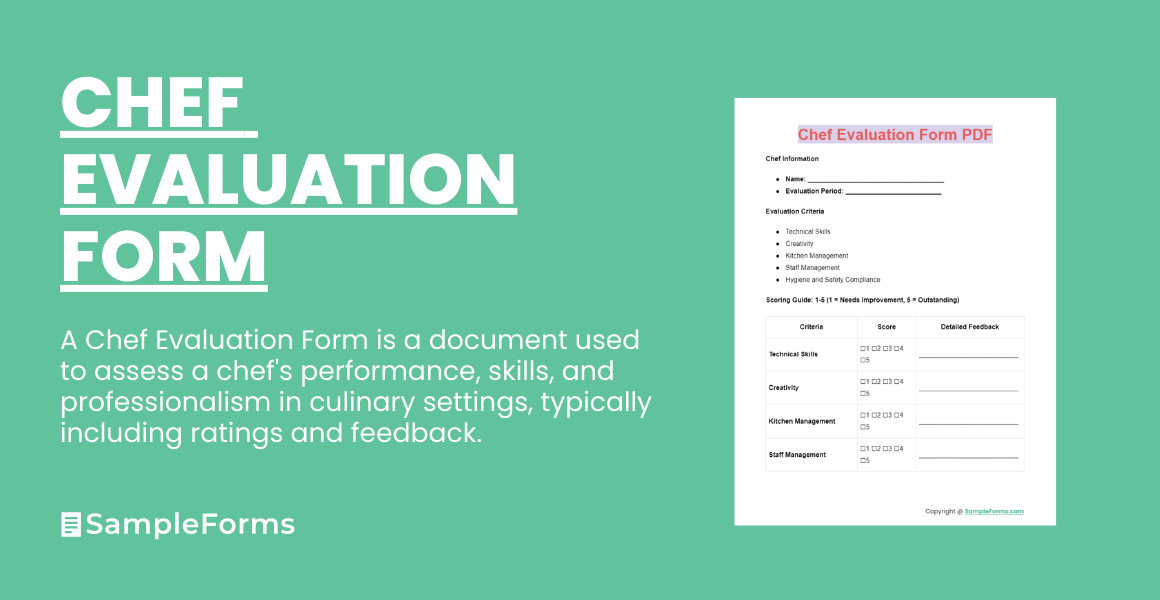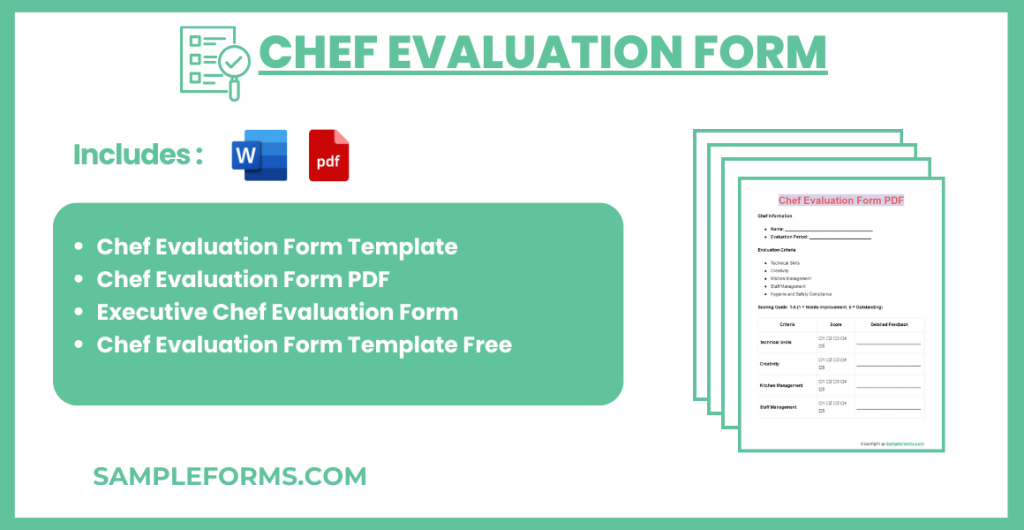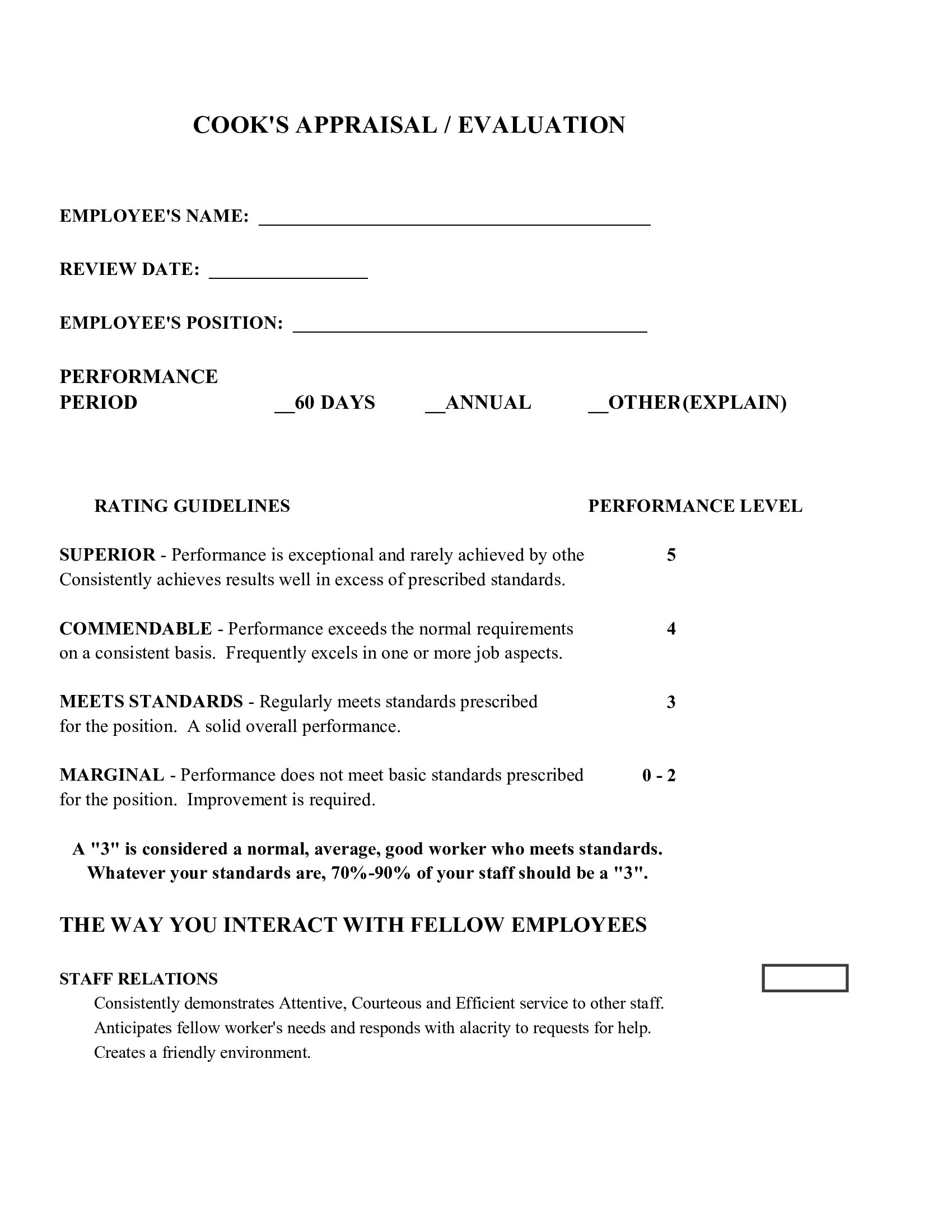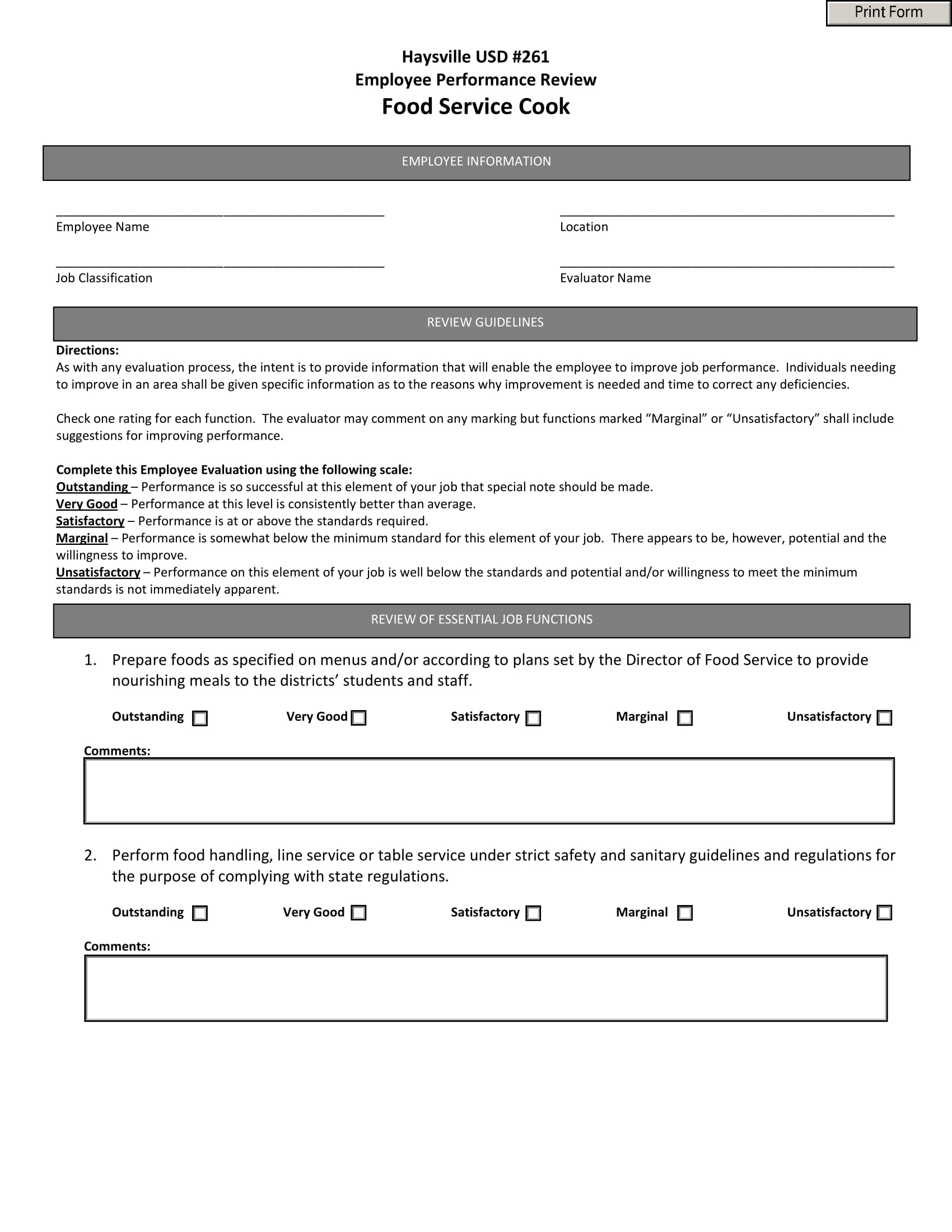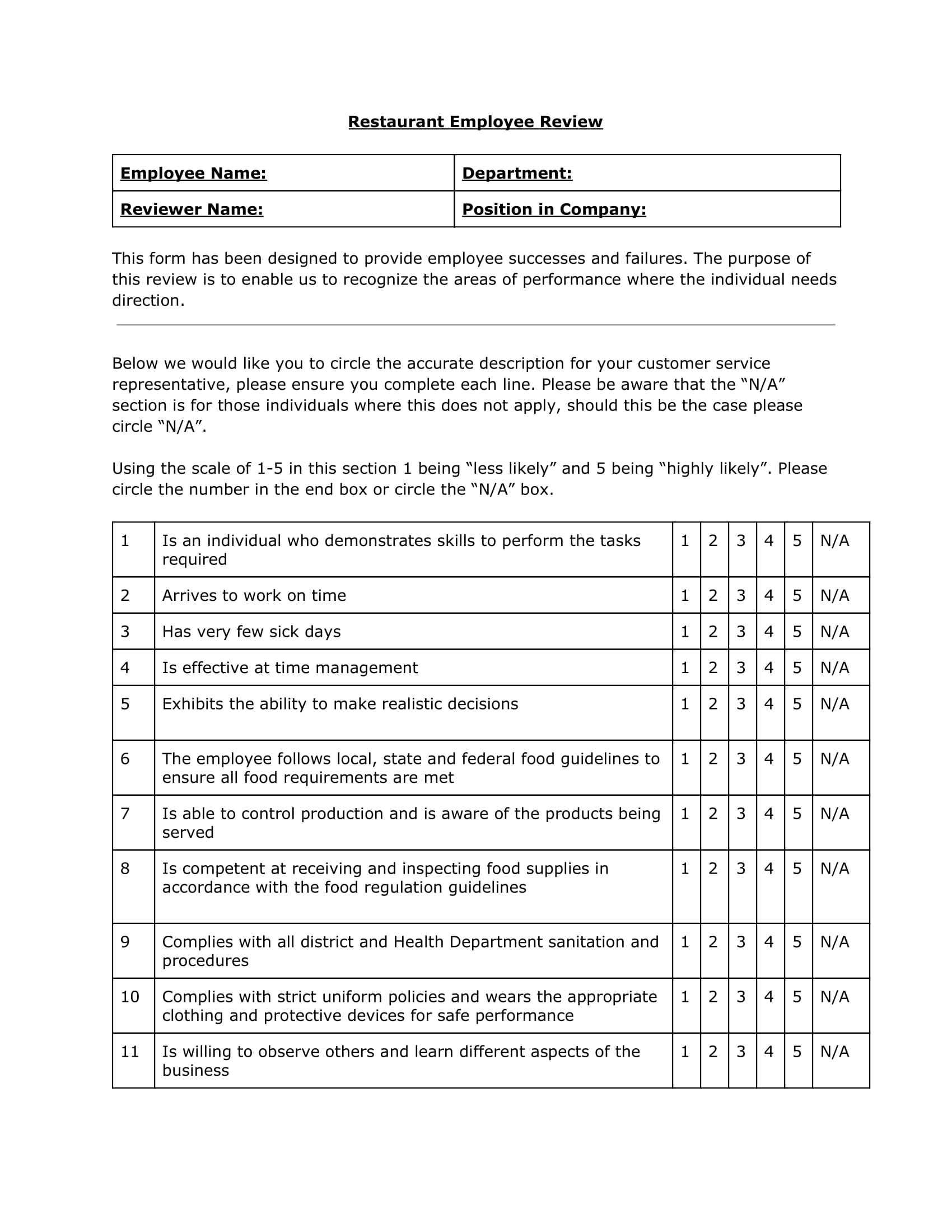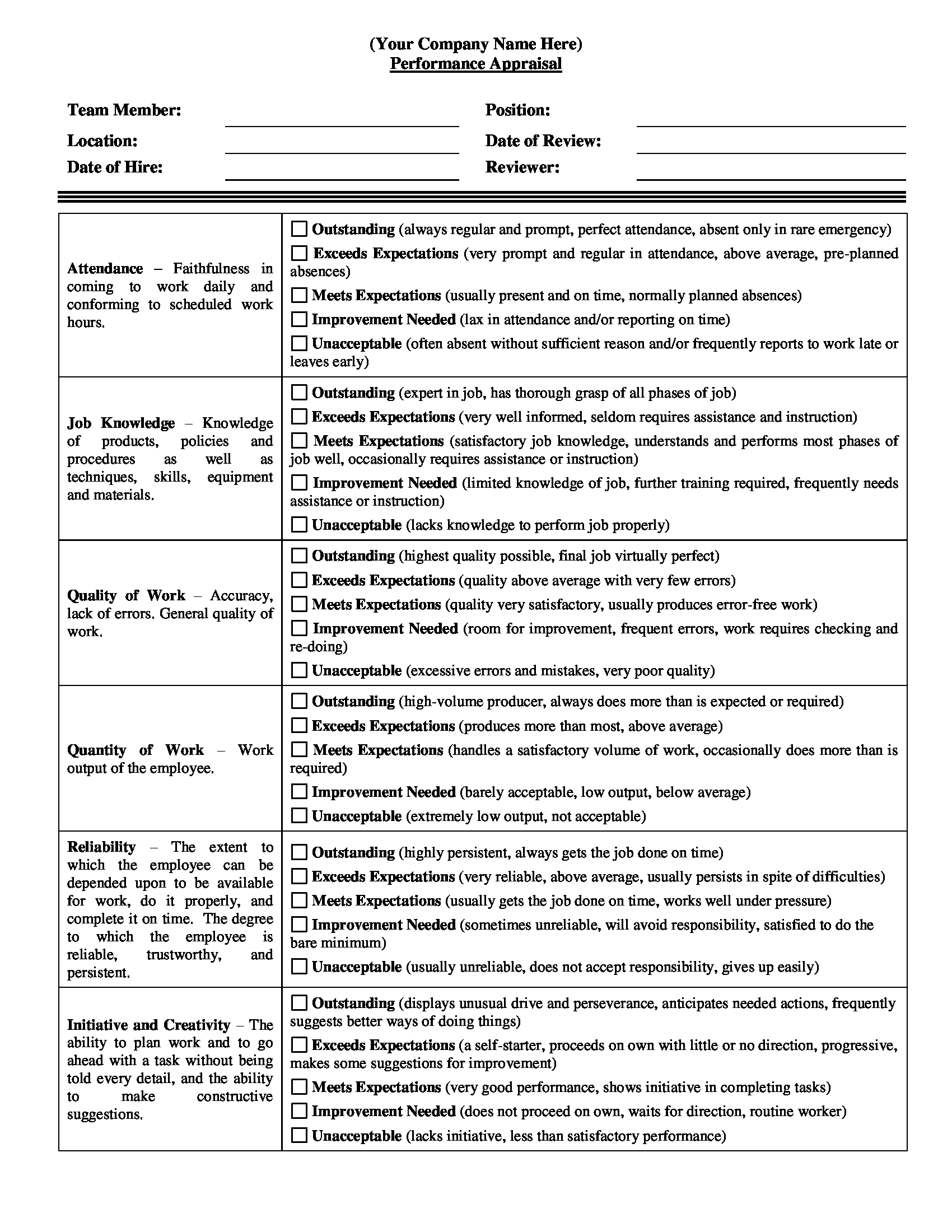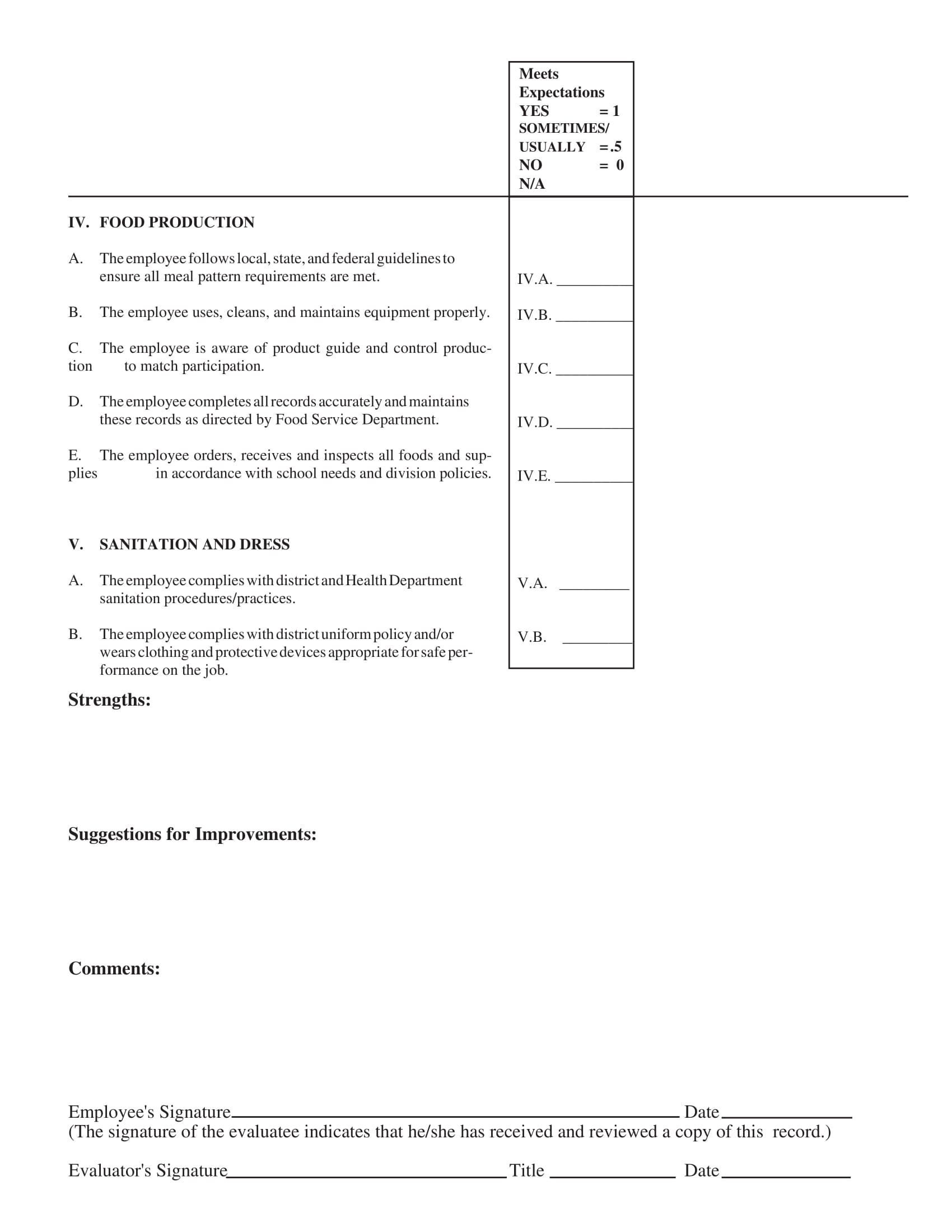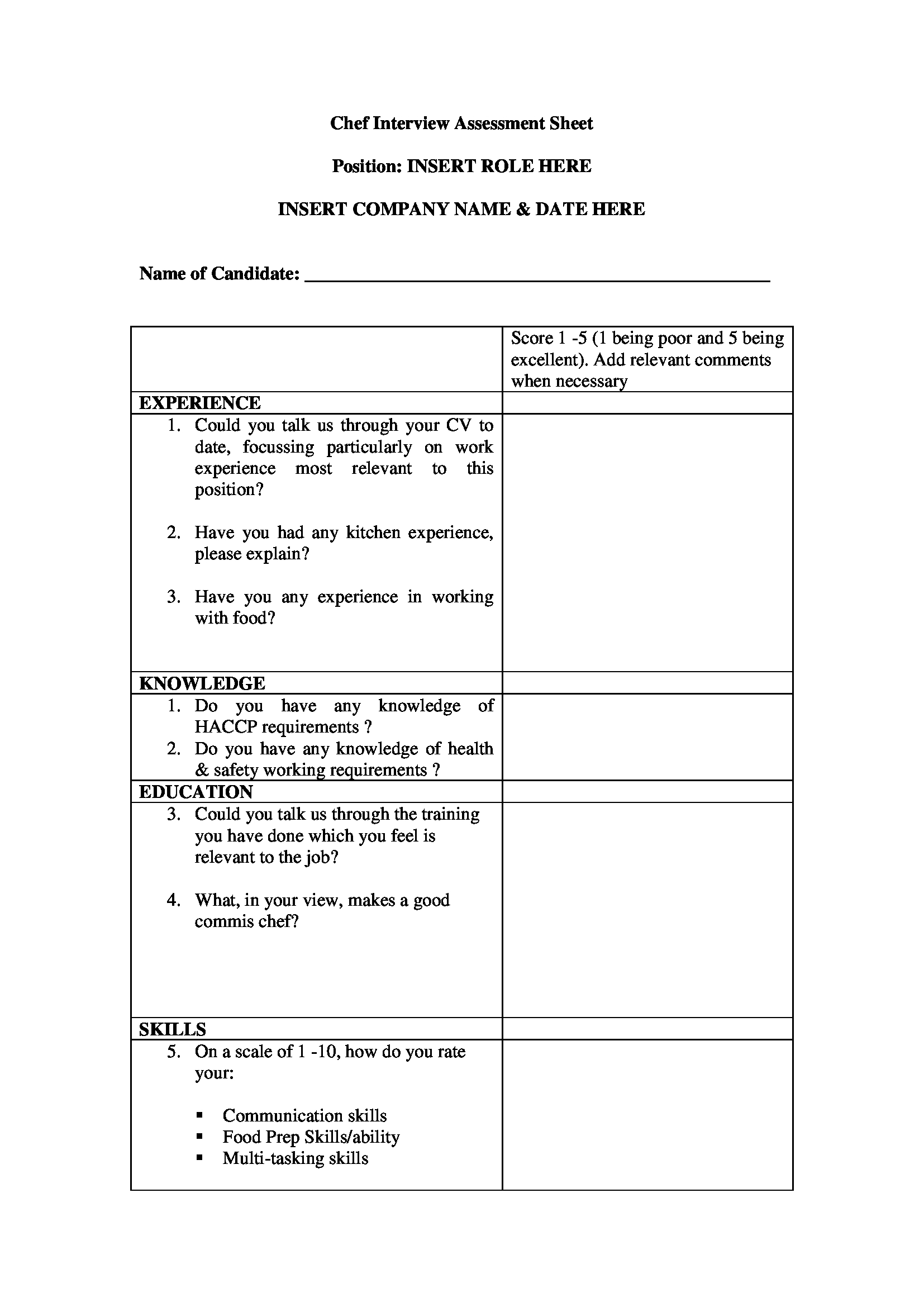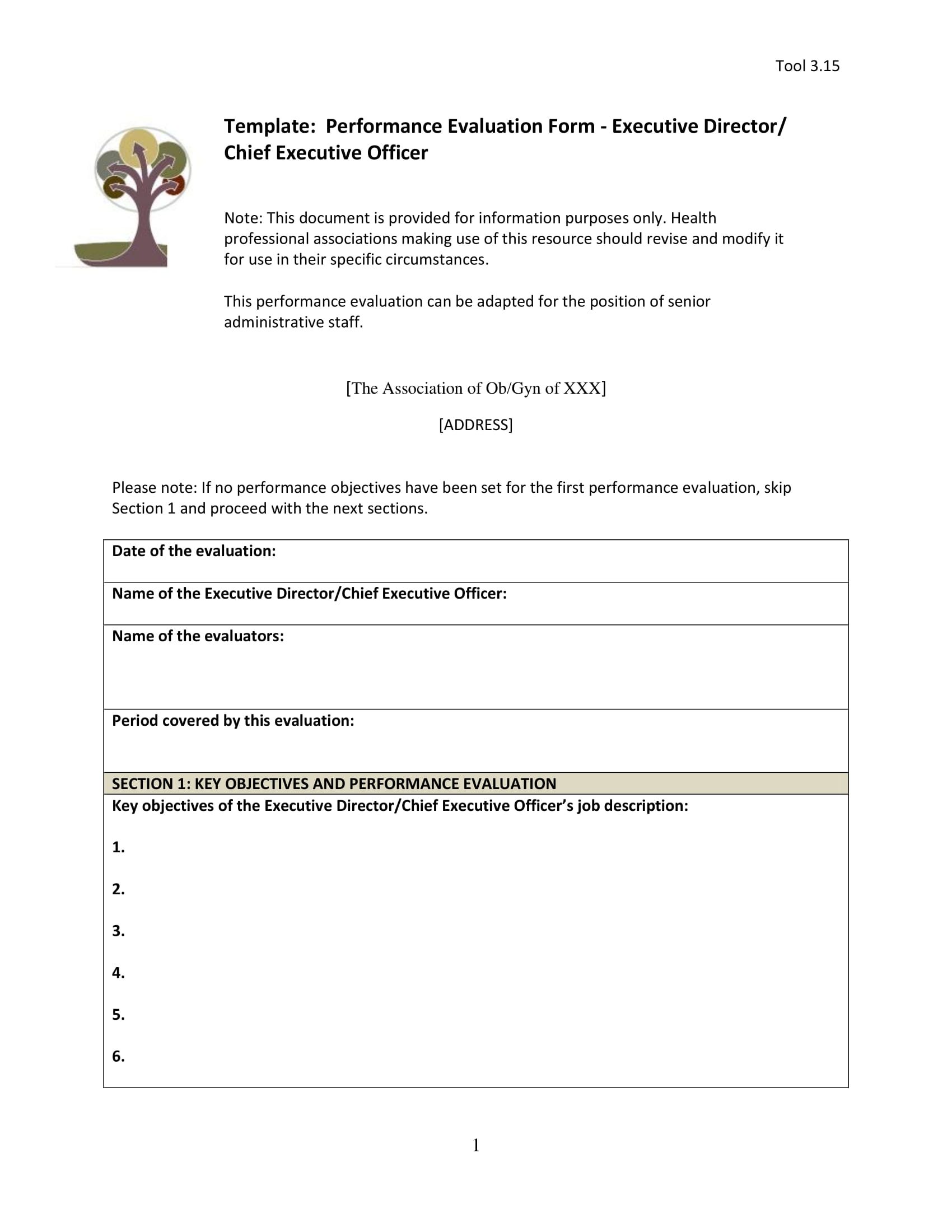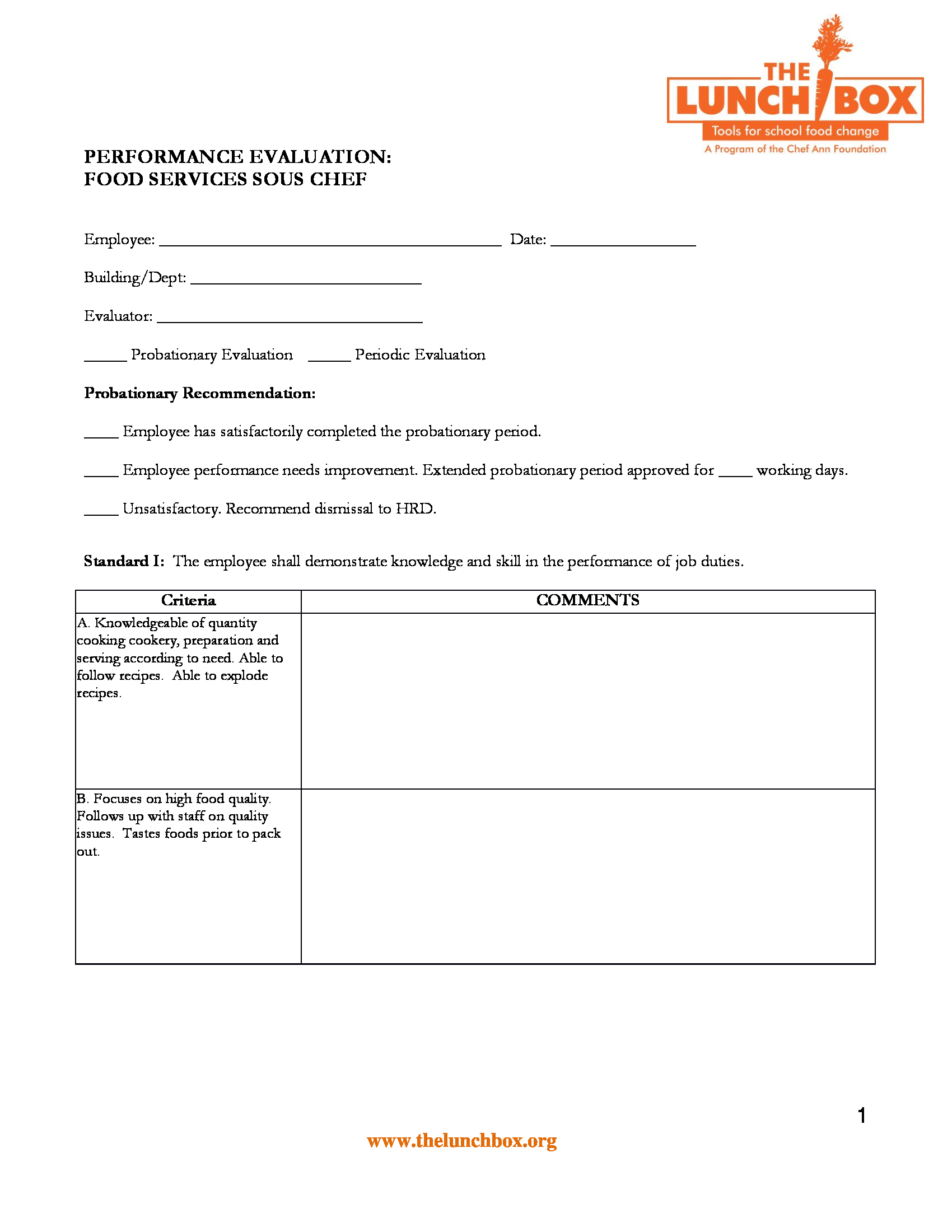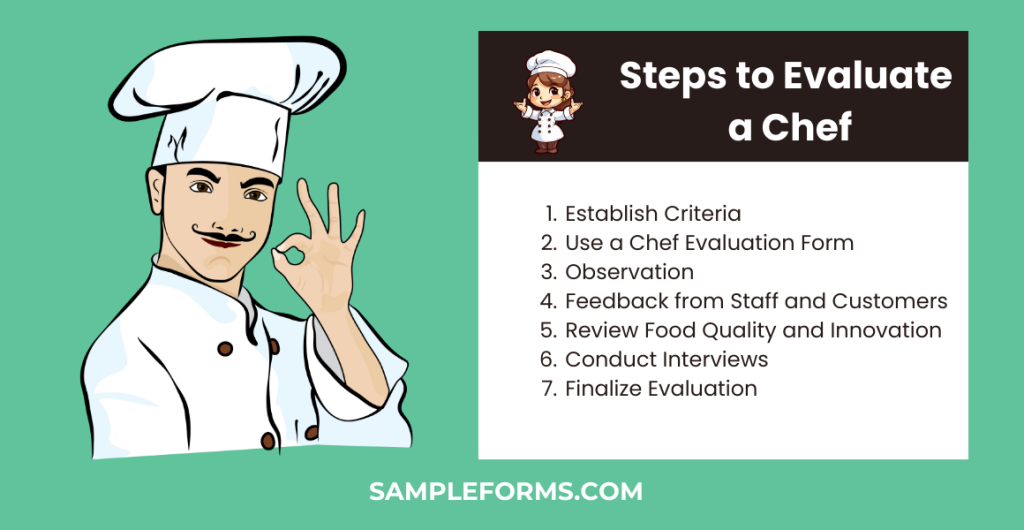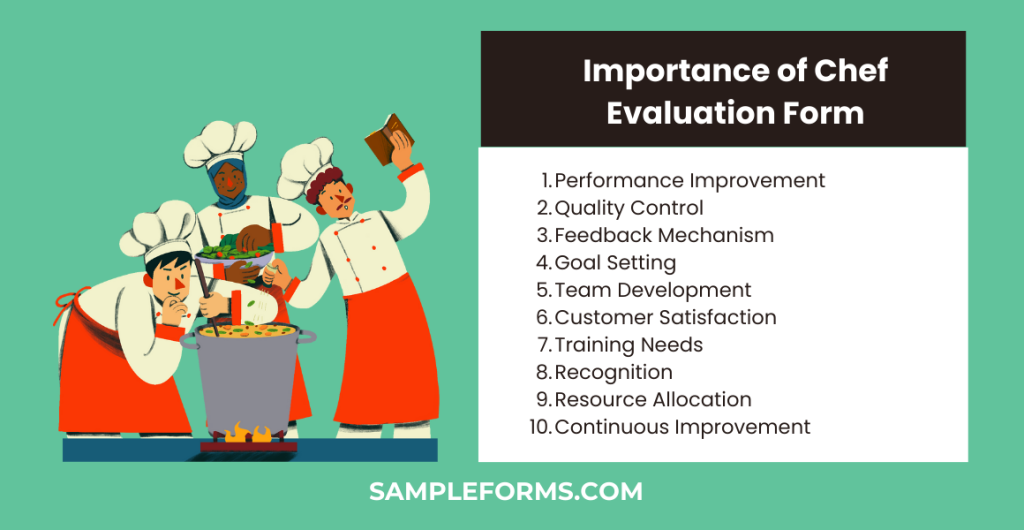Unlock the secrets to culinary excellence with our Chef Evaluation Form guide. This comprehensive tool not only assesses cooking skills but also kitchen management, creativity, and teamwork. Incorporating insights from the Evaluation Form and drawing parallels to the structured feedback of a Training Evaluation Form our guide is designed to enhance the culinary team’s performance. With practical examples, elevate your kitchen’s standards and dish out success one evaluation at a time.
Download Chef Evaluation Form Bundle
What is Chef Evaluation Form? – Meaning
A Chef Evaluation Form is a structured tool used to assess a chef’s performance in various areas, including culinary skills, creativity, kitchen management, and teamwork. This form helps in providing targeted feedback to chefs, fostering their professional growth and enhancing the overall quality of the culinary experience. Simple yet comprehensive, it’s akin to an Employee Performance Evaluation Form, tailored specifically for the dynamic world of professional cooking.
Chef Evaluation Format
Personal and Professional Information
- Chef’s Name:
- Position:
- Date of Evaluation:
- Evaluator’s Name:
- Restaurant/Establishment Name:
Evaluation Criteria
A. Culinary Skills and Knowledge
- Understanding of Different Cuisines:
- Rating: (1-5)
- Comments:
- Technical Skills (Cutting, Cooking Techniques, etc.):
- Rating: (1-5)
- Comments:
- Presentation and Plating Skills:
- Rating: (1-5)
- Comments:
- Innovation and Creativity:
- Rating: (1-5)
- Comments:
- Knowledge of Food Safety and Sanitation:
- Rating: (1-5)
- Comments:
B. Work Habits and Attitude
- Efficiency and Time Management:
- Rating: (1-5)
- Comments:
- Ability to Work Under Pressure:
- Rating: (1-5)
- Comments:
- Teamwork and Leadership Qualities:
- Rating: (1-5)
- Comments:
- Adherence to Recipes and Instructions:
- Rating: (1-5)
- Comments:
- Professionalism and Personal Presentation:
- Rating: (1-5)
- Comments:
C. Menu Development and Cost Management
- Ability to Develop and Plan Menus:
- Rating: (1-5)
- Comments:
- Understanding of Costing and Budget Management:
- Rating: (1-5)
- Comments:
- Use of Seasonal and Local Ingredients:
- Rating: (1-5)
- Comments:
- Sustainability Practices:
- Rating: (1-5)
- Comments:
D. Customer Satisfaction and Feedback
- Response to Customer Feedback:
- Rating: (1-5)
- Comments:
- Consistency in Delivering High-Quality Food:
- Rating: (1-5)
- Comments:
- Innovation in Meeting Customer Preferences:
- Rating: (1-5)
- Comments:
Overall Evaluation
- Strengths:
- Areas for Improvement:
- Goals for Next Evaluation Period:
Evaluator’s Comments
Chef’s Feedback
Signatures
- Evaluator’s Signature: ___________________________ Date: _________
- Chef’s Signature: _______________________________ Date: _________
Chef Evaluation Form Template
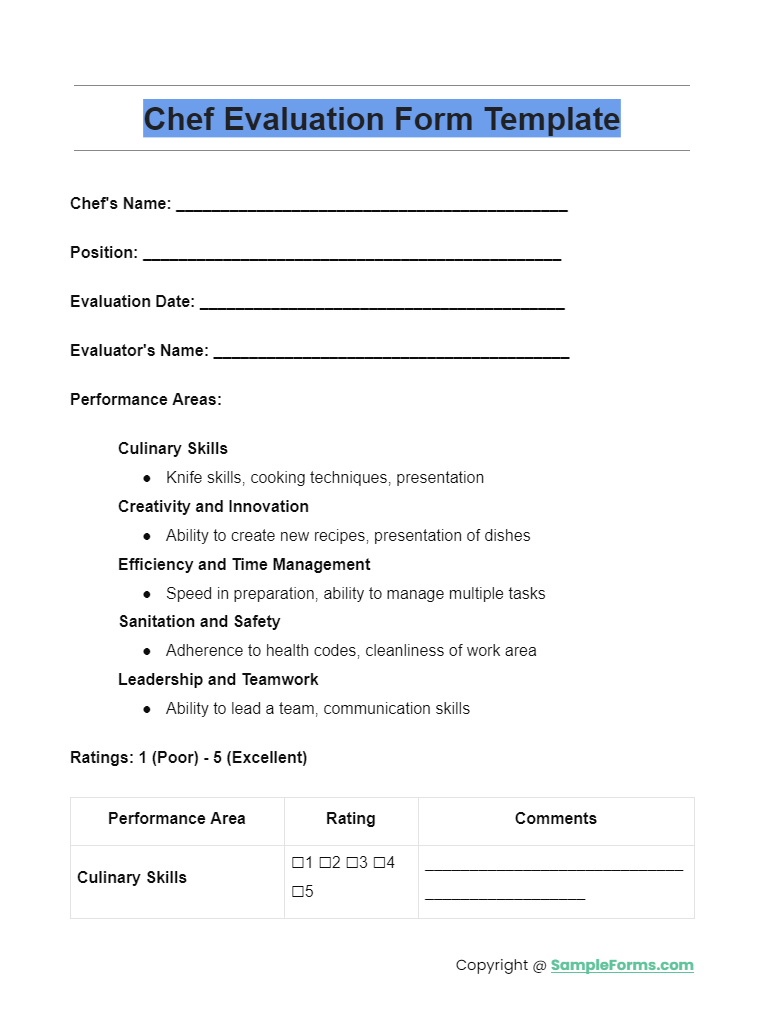
Discover the ultimate Chef Evaluation Form Template, designed to streamline the appraisal process in culinary settings. Incorporating aspects from the Internship Evaluation Form, this template aids in assessing both foundational culinary skills and the capacity for innovation, ensuring chefs meet the high standards expected in modern kitchens. You also browse our Mentor Evaluation Form
Chef Evaluation Form PDF, Word, Google Docs
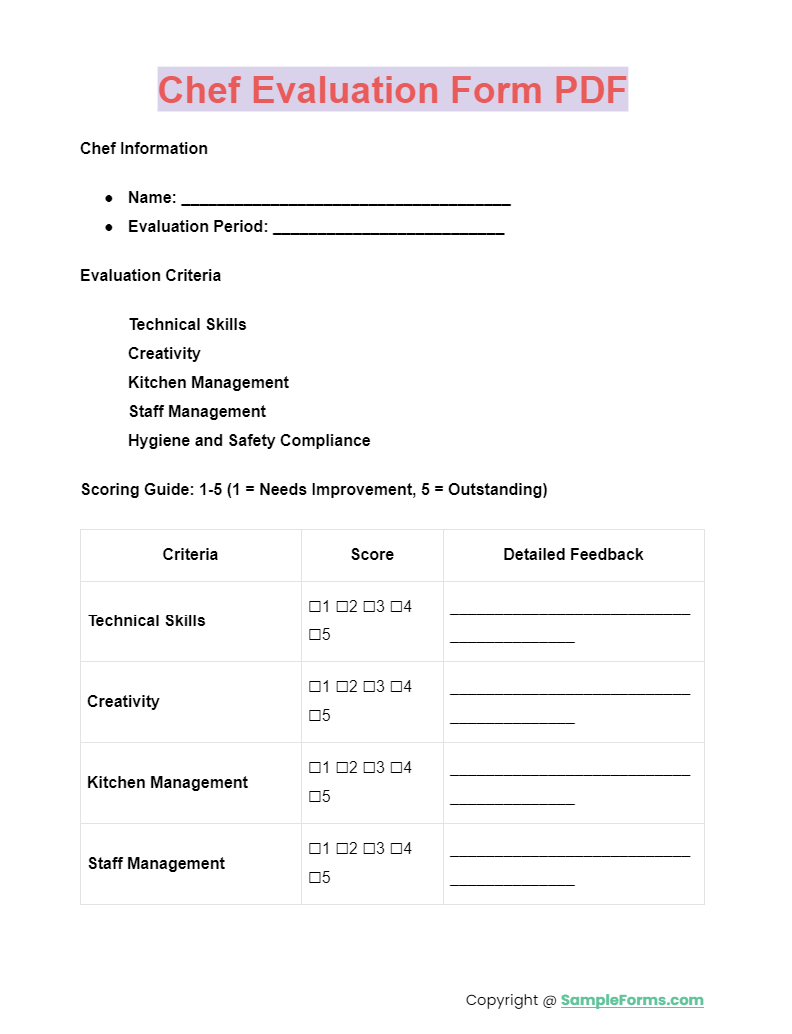
Our Chef Evaluation Form PDF is an essential tool for documenting chef performance, from creativity to execution. Drawing inspiration from the Food Evaluation Form, it offers a structured format for evaluating culinary creations, ensuring every dish served meets the establishment’s quality standards. You also browse our Mentee Evaluation Form.
Executive Chef Evaluation Form
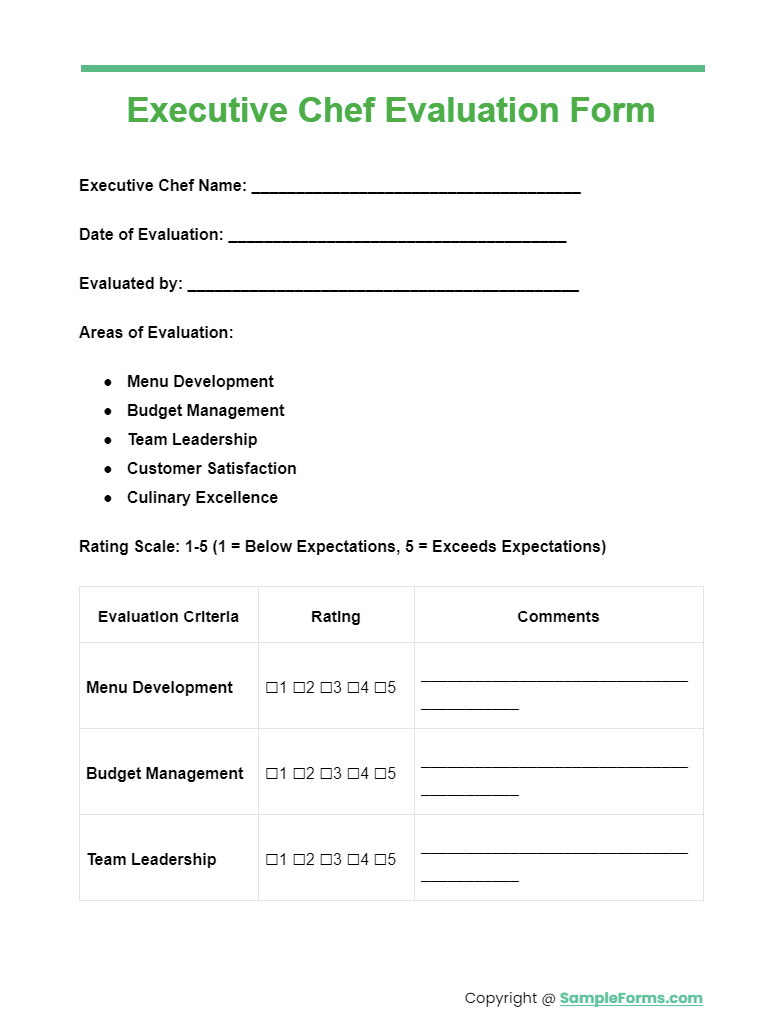
The Executive Chef Evaluation Form focuses on leadership, management, and culinary excellence. Integrating elements similar to a Course Evaluation Form, it assesses the executive chef’s ability to design menus, mentor kitchen staff, and maintain the highest standards of food safety and customer satisfaction. You also browse our Sensory Evaluation Form.
Chef Evaluation Form Template Free
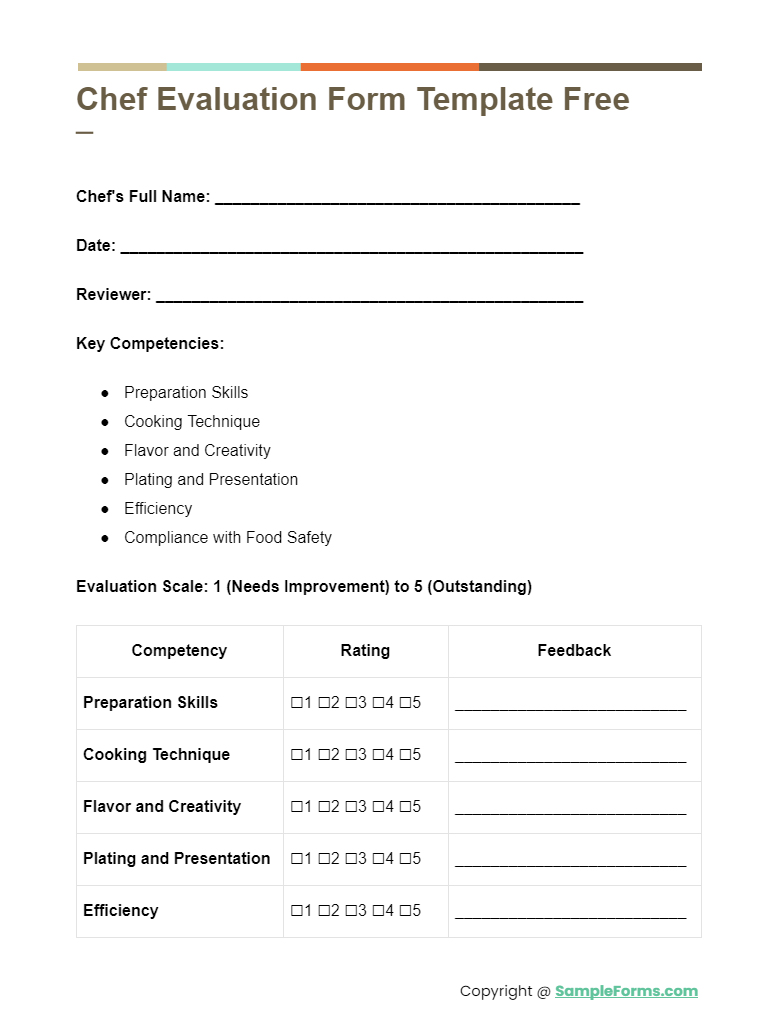
More Chef Evaluation Form Samples
Cook’s Appraisal Evaluation Form
Food Service Cook Performance Evaluation Form
Restaurant Employee Evaluation Form
Cook Performance Appraisal Form
Evaluation Form for Kitchen Staff
Chef Interview Assessment/Evaluation
Performance Evaluation for Executive Chef
Chef Performance Evaluation Form
How do you Evaluate a Chef?
Evaluating a chef involves a foloowing steps both culinary skills and managerial capabilities. The process includes:
- Establish Criteria: Define key performance indicators such as creativity, cooking skills, leadership, and kitchen management.
- Use a Chef Evaluation Form: Incorporate elements from the Self Evaluation Form to encourage chefs to reflect on their performance.
- Observation: Conduct regular observations of the chef’s work, including preparation, cooking techniques, and final presentation.
- Feedback from Staff and Customers: Utilize insights from a Peer Evaluation Form and customer satisfaction surveys to gauge the chef’s impact.
- Review Food Quality and Innovation: Apply criteria from the Food Sensory Evaluation Form to assess culinary creations.
- Conduct Interviews: Use an Interview Evaluation Form to discuss goals, challenges, and achievements with the chef.
- Finalize Evaluation: Compile findings into the Chef Evaluation Form, offering clear, actionable feedback.
How do you Evaluate Kitchen Staff Performance?
Evaluating kitchen staff performance requires a balance of observational insights and direct feedback:
- Define Performance Metrics: Criteria should include efficiency, teamwork, adherence to safety standards, and culinary skill level.
- Utilize an Employee Evaluation Form: This form helps in systematically assessing and documenting staff performance.
- Peer Reviews: Encourage a culture of feedback with a Functional Capacity Evaluation Form, allowing staff to evaluate each other’s strengths and areas for improvement.
- Direct Observation: Regularly observe kitchen operations, focusing on workflow efficiency, communication, and safety practices.
- Feedback Sessions: Conduct individual meetings using the Employee Self Evaluation Form as a basis for discussion, promoting self-awareness.
- Action Plan: Develop a personalized improvement plan based on evaluation outcomes, targeting specific skills or behaviors for enhancement.
How do you write a Performance Evaluation Form?
Writing an effective Performance Evaluation Form involves several key steps:
- Identify Evaluation Objectives: Clearly state what the evaluation aims to achieve, such as improving performance or identifying training needs.
- Develop Clear Criteria: Include specific performance metrics, drawing inspiration from a Call Monitoring Evaluation Form for structured feedback.
- Incorporate Rating Scales: Use numerical or descriptive rating scales to quantify performance levels.
- Include Open-Ended Questions: Encourage detailed feedback and self-reflection, similar to the approach in a Speech Evaluation Form.
- Feedback and Goals Section: Provide space for future objectives and improvement plans, akin to a Nurse Evaluation Form.
- Review and Update Regularly: Ensure the form remains relevant and aligned with organizational goals.
What is a Good Evaluation Form?
A good evaluation form is structured, objective, and facilitates actionable feedback. Steps to create one include:
- Objective Clarity: Clearly define the purpose, whether it’s for a Supplier Evaluation Form or an Employee Evaluation Form.
- Balanced Criteria: Include a mix of quantitative and qualitative assessment areas, ensuring a holistic view of performance.
- User-Friendly Design: Ensure the form is easy to understand and complete, which is crucial for forms like the Debate Evaluation Form.
- Anonymity Option: For peer reviews or sensitive assessments, anonymity can encourage honest feedback.
- Actionable Feedback: Structure questions to yield insights that can lead to performance improvements.
- Regular Reviews: Like any process, regularly revisiting the evaluation form for updates or improvements ensures its effectiveness.
Chef Evaluation Form Importance
- Performance Improvement: Identifies areas for growth and development in culinary skills.
- Quality Control: Ensures consistency and excellence in food preparation and presentation.
- Feedback Mechanism: Facilitates constructive feedback from supervisors and peers.
- Goal Setting: Helps chefs set achievable goals for career advancement.
- Team Development: Promotes teamwork and collaboration among kitchen staff.
- Customer Satisfaction: Maintains high standards to meet customer expectations.
- Training Needs: Highlights areas where additional training or support may be required.
- Recognition: Acknowledges exceptional performance and encourages motivation.
- Resource Allocation: Guides resource allocation based on performance assessments.
- Continuous Improvement: Supports ongoing improvement in culinary practices and overall kitchen operations.
How do you write a Good Chef Review?
A good chef review, akin to feedback in a Workshop Evaluation Form, should be detailed, highlighting specific dishes, creativity, and presentation skills, alongside how the chef’s work enhances the dining experience. You should also take a look at our Sales Evaluation Form.
What is the Best Rating for a Chef?
The best rating for a chef, similar to top scores in a Sales Evaluation Form, reflects excellence in culinary skills, innovation, and the ability to consistently deliver high-quality, delicious dishes. You should also take a look at our Candidate Evaluation Form.
What is the Best Recognition for Chefs?
The best recognition for chefs often mirrors the prestige of awards in a Candidate Evaluation Form, including Michelin stars, James Beard Awards, or accolades from respected culinary institutions. You should also take a look at our Seminar Evaluation Form.
What are the Three Skills of a Competent Chef?
A competent chef, like a standout candidate in a Customer Service Evaluation Form, must excel in culinary expertise, creativity in menu planning, and strong leadership to manage kitchen operations efficiently. You should also take a look at our Resume Evaluation Form
What is Chef Judging Criteria?
Chef judging criteria, akin to parameters in a Bid Evaluation Form, typically include culinary skill, creativity, presentation, taste, and how well the chef can work under pressure during competitions or busy kitchen operations. You should also take a look at our Proposal Evaluation Form
How would you describe a Talented Chef?
A talented chef, as noted in a Restaurant Employee Evaluation Form, is one who combines exceptional culinary skills with creativity, an innate understanding of flavors, and the ability to innovate, captivating diners with each dish. You should also take a look at our Trainee Evaluation Form
In conclusion, a Chef Evaluation Form is an indispensable tool in the culinary industry, offering a structured way to review and improve the skills of professional chefs. Through detailed samples, forms, and usage guides, it acts similarly to an Employee Performance Evaluation Form, ensuring chefs meet and exceed their performance expectations. Embrace this resource to cultivate excellence within your culinary team and elevate your dining experience.
Related Posts
-
FREE 6+ Business Credit Checklist Forms in PDF
-
Employee Pay Increase Form
-
FREE 8+ Kitchen Evaluation Forms in PDF | MS Word
-
Customer Service Evaluation Form
-
FREE 15+ Grant Evaluation Forms in PDF | MS Word
-
FREE 14+ Volunteer Evaluation Forms in PDF
-
Mentee Evaluation Form
-
Speaker Evaluation Form
-
FREE 14+ Vehicle Evaluation Forms in PDF
-
FREE 14+ Trainee Evaluation Forms in MS Word | PDF
-
Resume Evaluation Form
-
FREE 14+ Retreat Evaluation Forms in PDF
-
Debate Evaluation Form
-
FREE 14+ Book Evaluation Forms in PDF | MS Word
-
Food Evaluation Form
